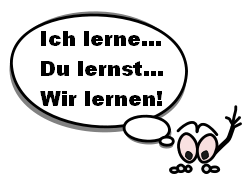
Czas teraźniejszy Präsens określa czynność dziejącą się obecnie np. Ich fahre Rad. (Jadę rowerem.) Thomas liest ein Buch. (Tomek czyta książkę.) Wir sehen am Abend fern. (Oglądamy wieczorem telewizję.) Do czasu teraźniejszego Präsens należą czasowniki regularne, nieregularne, zwrotne, rozdzielnie złożone, nierozdzielnie złożone, modalne i posiłkowe. Każdy czasownik odmieniamy do osoby i warto wiedzieć, jakie są zasady tej odmiany.
1. Czasowniki regularne (regelmässige Verben) jak nazwa wskazuje, odmieniają się regularnie. Do tematu czasownika dochodzą odpowiednie końcówki. Przykładowe czasowniki należące do tej grupy to:
kaufen (kupować), machen (robić), malen (malować), schreiben (pisać), singen (śpiewać), trinken (pić)
| kaufen | machen | malen | schreiben | singen | trinken | |
| Ich | kaufe | mache | male | schreibe | singe | trinke |
| Du | kaufst | machst | malst | schreibst | singst | trinkst |
| Er/sie/es | kauft | macht | malt | schreibt | singt | trinkt |
| Wir | kaufen | machen | malen | schreiben | singen | trinken |
| Ihr | kauft | macht | malt | schreibt | singt | trinkt |
| Sie/sie | kaufen | machen | malen | schreiben | singen | trinken |
2. Czasowniki nieregularne (unregelmässige Verben) odmieniają się jak regularne, czyli dodaje się do tematu odpowiednie końcówki, ale oprócz tego zachodzi jeszcze w osobach „du” i „er/sie/es” pewna zmiana (tzw. nieregularność).
a) a = ä
|
b) e = i
|
c) e = ie
|
| fahren | schlafen | sprechen | werfen | nehmen | essen | sehen | lesen | |
| Ich | fahre | schlafe | spreche | werfe | nehme | esse | sehe | lese |
| Du | fährst | schläfst | sprichst | wirfst | nimmst | isst | siehst | liest |
| Er/sie/es | fährt | schläft | spricht | wirft | nimmt | isst | sieht | liest |
| Wir | fahren | schlafen | sprechen | werfen | nehmen | essen | sehen | lesen |
| Ihr | fahrt | schlaft | sprecht | werft | nehmt | esst | seht | lest |
| Sie/sie | fahren | schlafen | sprechen | werfen | nehmen | essen | sehen | lesen |
3. Czasowniki zwrotne (reflexive Verben) występują z „sich”, czyli „się”, które odmienia się przez osoby. Przykładowe czasowniki należące do tej grupy to:
- sich freuen (cieszyć się)
- sich waschen (myć się)
- sich interessieren (interesować się)
| sich freuen | sich waschen | sich interessieren | |
| Ich | freue mich | wasche mich | interessiere mich |
| Du | freust dich | wäschst dich | interessierst dich |
| Er/sie/es | freut sich | wäscht sich | interessiert sich |
| Wir | freuen uns | waschen uns | interessieren uns |
| Ihr | freut euch | wascht euch | interessiert euch |
| Sie/sie | freuen sich | waschen sich | interessieren sich |
4. Czasowniki rodzielnie złożone (trennbare Verben) – jak nazwa wskazuje, trzeba te czasowniki rozdzielić przy odmianie. Oddzielamy przedrostek od tematu czasownika:
- einkaufen (kupować)
- fernsehen (oglądaćTV)
- einladen (zapraszać)
- zumachen (zamykać)
| einkaufen | fernsehen | einladen | zumachen | |
| Ich | kaufe ein | sehe fern | lade ein | mache zu |
| Du | kaufst ein | siehst fern | lädst ein | machst zu |
| Er/sie/es | kauft ein | sieht fern | lädt ein | macht zu |
| Wir | kaufen ein | sehen fern | laden ein | machen zu |
| Ihr | kauft ein | seht fern | ladet ein | macht zu |
| Sie/sie | kaufen ein | sehen fern | laden ein | machen zu |
5. Czasowniki nierozdzielnie złożone (untrennbare Verben) wyglądają podobnie jak rozdzielne, jednak zaznaczone na czerwono przedrostki nie rozdzielają się.
- bezahlen (zapłacić)
- verkaufen (sprzedać)
- gefallen (podobać)
- ertragen (znosić)
- empfinden (odczuwać)
- entstehen (powstawać)
- missbrauchen (wykorzystywać)
| bezahlen | verkaufen | gefallen | entstehen | |
| Ich | bezahle | verkaufe | gefalle | entstehe |
| Du | bezahlst | verkaufst | gefällst | entstehst |
| Er/sie/es | bezahlt | verkauft | gefällt | entsteht |
| Wir | bezahlen | verkaufen | gefallen | entstehen |
| Ihr | bezahlt | verkauft | gefallt | entsteht |
| Sie/sie | bezahlen | verkaufen | gefallen | entstehen |
6. Czasowniki modalne (Modalverben) są zamkniętą grupą czasowników, czyli jest ich tylko tyle, ile widać poniżej. Odmieniają się różnie, dlatego najlepiej nauczyć się ich odmiany na pamięć:
-
- können (móc,umieć,potrafić)
- müssen (musieć)
- wollen (chcieć)
- sollen (mieć powinność)
- dürfen (mieć pozwolenie)
- mögen (lubić)
- möchten (chcieć)
| können | müssen | wollen | sollen | dürfen | mögen | |
| Ich | kann | muss | will | soll | darf | mag |
| Du | kannst | musst | willst | sollst | darfst | magst |
| Er/sie/es | kann | muss | will | soll | darf | mag |
| Wir | können | müssen | wollen | sollen | dürfen | mögen |
| Ihr | könnt | müsst | wollt | sollt | dürft | mögt |
| Sie/sie | können | müssen | wollen | sollen | dürfen | mögen |
7. Czasowniki posiłkowe (Hilfsverben):
- haben (mieć)
- sein (być)
- werden (stawać się, zostać)
| haben | sein | |
| Ich | habe | bin |
| Du | hast | bist |
| Er/sie/es | hat | ist |
| Wir | haben | sind |
| Ihr | habt | seid |
| Sie/sie | haben | sind |

